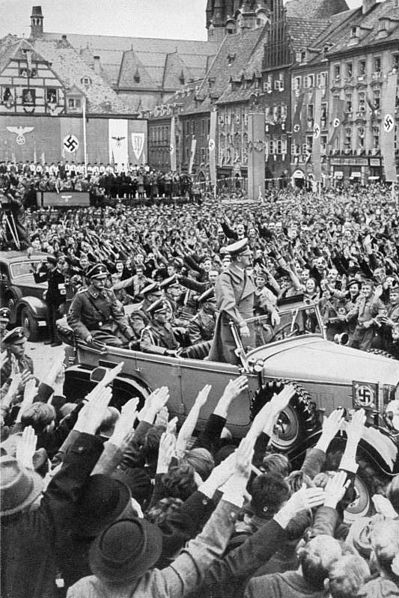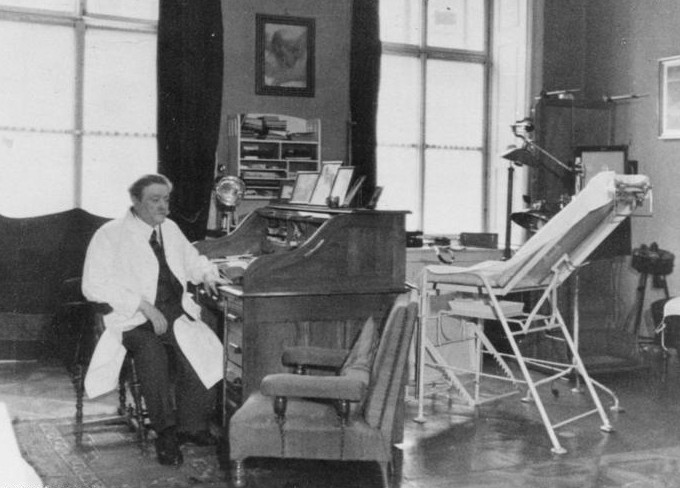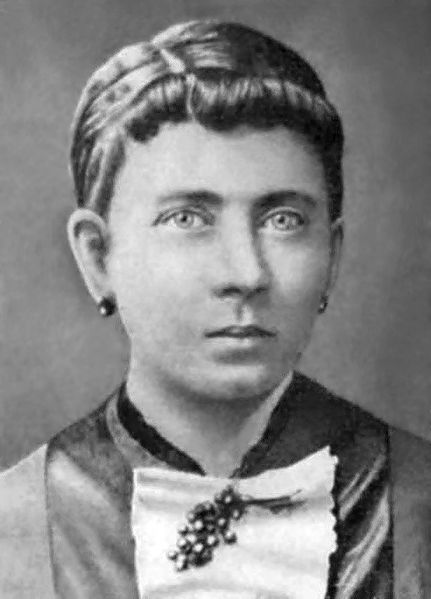In 1907 Hitler’s mother was diagnosed with breast cancer, but due to poor economic conditions Dr. Eduard Bloch treated her at a reduced rate. After Klara died, Hitler gave the Jewish doctor his “everlasting gratitude” for his kindness.
The Hero Returns
Soon the procession arrived — the great, black Mercedes car, a six-wheeled affair, flanked by motorcycles. The frail boy I had treated so often, and whom I had not seen for thirty years — stood in the car. I had accorded him only kindness; what was he now to do to the people I loved? I peered over the heads of the crowd at Adolf Hitler.
It was a moment of tense excitement.  For years Hitler had been denied the right to visit the country of his birth. Now that country belonged to him. The elation that he felt was written on his features. He smiled, waved, gave the Nazi salute to the people that crowded the street. Then, for a moment he glanced up at my window. I doubt that he saw me, but he must have had a moment of reflection. Here was the home of the Edeljude who had diagnosed his mother’s fatal cancer; here was the consultation room of the man who had treated his sisters; here was the place he had gone as a boy to have his minor ailments attended.
For years Hitler had been denied the right to visit the country of his birth. Now that country belonged to him. The elation that he felt was written on his features. He smiled, waved, gave the Nazi salute to the people that crowded the street. Then, for a moment he glanced up at my window. I doubt that he saw me, but he must have had a moment of reflection. Here was the home of the Edeljude who had diagnosed his mother’s fatal cancer; here was the consultation room of the man who had treated his sisters; here was the place he had gone as a boy to have his minor ailments attended.
It was a brief moment. Then the procession was gone. It moved slowly into the town square — once Franz Josef Platz, soon to be renamed Adolf Hitler Platz. He spoke from the balcony of the town hall. I listened on the radio. Historic words: Germany and Austria were now one.
Hitler established himself in the Weinzinger Hotel, particularly requesting an apartment with a view of the Poestling Mountain. This scene had been visible from the windows of the modest apartment where he spent his boyhood.
The following day he called in a few old acquaintances: Oberhummer, a local party functionary; Kubitschek [Kubizek], the musician; Liedel, the watchmaker; Dr. Huemer, his former history teacher. It was understandable that he couldn’t ask me, a Jew, to such a meeting; yet he did inquire after me. For a while I thought of asking for an audience, then decided this would be unwise.
Hitler arrived Saturday evening. Sunday he visited his mother’s grave, and reviewed local Nazis as they marched before him. Not equipped with uniforms, they wore knickerbockers, ski pants or leather shorts. On Monday Hitler departed for Vienna.
Soon we were brought to a sharp realization of how different things were to be. There were 700 Jews in Linz. Shops, homes and offices of all these people were marked with the yellow-paper banners now visible throughout Germany, JUDE — Jew.
The first suggestion that I was to receive special favors came one day when the local Gestapo telephoned. I was to remove the yellow signs from my office and home. Then a second thing happened: My landlord, an Aryan, went to Gestapo headquarters to ask if I were to be allowed to remain in my apartment. “We wouldn’t dare touch that matter,” he was told. “It will be handled by Berlin.” Hitler, apparently, had remembered. Then something happened that made me doubt.
For no reason whatsoever my son-in-law, a young physician, was jailed. No one was allowed to see him, and we received no news of him. My daughter went to the Gestapo. “Would the Leader like to know that the son-in-law of his old physician had been sent to prison?” she asked. She was treated rudely and brusquely for her temerity. Hadn’t the signs been removed from her father’s house? Wasn’t that enough? Yet her visit must have had some effect. Within three weeks her husband was released.

My practice, which I believe was one of the largest in Linz, had begun to dwindle as long as a year before the arrival of Hitler. In this I might have seen a portent of things to come. Faithful older patients were quite frank in their explanations. The hatred preached by the Nazis was taking hold with the younger people. They would no longer patronize a Jew.
By decree, my active practice was limited to Jewish patients. This was another way of saying that I was to cease work altogether. For plans were in the making for ridding the town of all Jews. On November 10, 1938, the ruling was issued that all Jews were to leave Linz within forty-eight hours. They were to go to Vienna. The shock that attended this edict may be imagined. People who had lived all their lives in Linz were to sell their property, pack and depart in the space of two days.
I called at the Gestapo. Was I to leave? I was informed that an exception had been made in my case. I could remain. My daughter and her husband? Since they had already signified their intention of emigrating to America, they also could stay. But they would have to vacate their house. If there was room in my apartment they would be permitted to move there.
No More Favors
After thirty-seven years of active work my practice was at an end. I was permitted to treat only Jews. After the evacuation order there were but seven members of this race left in Linz. All were over eighty years of age.
It is understandable that my daughter and her husband would wish to take their life savings with them when they departed for America. So would I when my turn came to depart. Getting any local ruling on such a matter was out of the question. I knew that I couldn’t see Adolf Hitler. Yet I felt that if I could get a message to him he would perhaps give us some help.
If Hitler himself was inaccessible perhaps one of his sisters would aid us. Klara was the nearest; she lived in Vienna. Her husband had died and she lived alone in a modest apartment in a quiet residential district. Plans were made for my daughter, Gertrude, to make the trip to Vienna to see her. She went to the apartment, knocked, but got no answer. Yet she was sure that there was someone at home.
 She sought the aid of a neighbor. Frau Wolf — Klara Hitler — received no one, the neighbor said, except a few intimate friends. But this kind woman agreed to carry a message and report Frau Wolf’s reply. My daughter waited. Soon the answer came back. Frau Wolf sent greetings and would do whatever she could. By good fortune Hitler was in Vienna that night for one of his frequent but unheralded visits to the opera. Frau Wolf saw him and, I feel sure, gave him the message. But no exception was made in our case. When our turn came we were forced to go penniless, like so many thousands of others.
She sought the aid of a neighbor. Frau Wolf — Klara Hitler — received no one, the neighbor said, except a few intimate friends. But this kind woman agreed to carry a message and report Frau Wolf’s reply. My daughter waited. Soon the answer came back. Frau Wolf sent greetings and would do whatever she could. By good fortune Hitler was in Vienna that night for one of his frequent but unheralded visits to the opera. Frau Wolf saw him and, I feel sure, gave him the message. But no exception was made in our case. When our turn came we were forced to go penniless, like so many thousands of others.
How has Hitler treated an old friend — one who cared for his family with patience, consideration and charity? Let’s sum up the favors:
I don’t believe that another Jew in all Austria was allowed to keep his passport. No J was stamped on my ration card, once food became scarce. This was most helpful because Jews today are allowed to shop only during restricted hours which are often inconvenient. Without the J on my card I could buy at any time. I was even given a ration card for clothes — something generally denied Jews.
If my relations with the Gestapo were not precisely cordial, I at least didn’t suffer at their hands as did so many others. I was told on good authority, and I can well believe it, that the bureau in Linz had received special instructions from the chancellery in Berlin that I was to be accorded any reasonable favor.
It is possible, but unlikely, that my war record was particularly responsible for these small considerations. During the war I had charge of a 1,000-bed military hospital, and my wife supervised welfare work among the sick. I was twice decorated for this service.
To read more of Eduard Bloch’s account of Adolf Hitler, visit the Institute for Historical Review.
Comment |

 Share on Facebook
Share on Facebook
 Tweet
Tweet
 Add My Story
Add My Story






